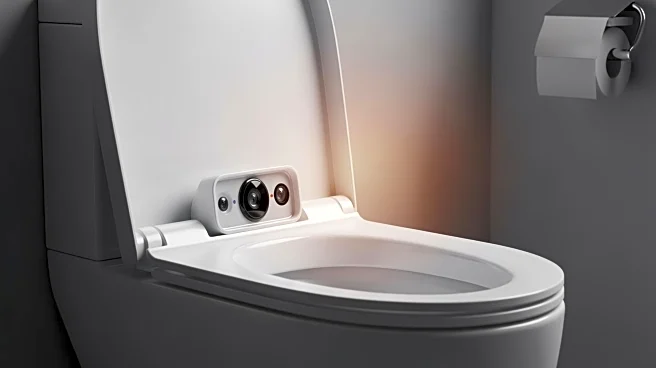What's Happening?
Kohler, a home products company, has introduced a new division called Kohler Health, with its first product being a $599 camera designed for toilets. Named Dekoda, this device utilizes sensors and machine
learning algorithms to analyze waste materials in the toilet bowl. The data collected can provide insights into hydration levels, gut health, and detect the presence of blood. This information is then transmitted to Kohler Health's iPhone app, with plans for Android support in the future. The product includes a magnetic charging pad and a wall-mounted remote, which can use Bluetooth fingerprint authorization for privacy. Kohler aims to transform bathrooms into connected health and wellness hubs, offering personalized health insights.
Why It's Important?
The introduction of Dekoda represents a significant step in integrating technology into everyday health monitoring. By providing real-time data on bodily waste, users can gain valuable insights into their health, potentially leading to early detection of health issues. This innovation could influence the healthcare industry by promoting proactive health management and personalized wellness experiences. However, the high cost of the device and the subscription requirement may limit accessibility, raising questions about the affordability and practicality of such technology for the average consumer.
What's Next?
Dekoda products are set to ship starting tomorrow, with Kohler Health offering subscription plans for individuals and families. As the product becomes available, consumer reactions and adoption rates will be crucial in determining its success. The healthcare industry may observe this development closely, considering potential collaborations or similar innovations. Additionally, Kohler's move may prompt other companies to explore technology-driven health solutions, potentially leading to a broader market for smart health devices.
Beyond the Headlines
The launch of Dekoda raises ethical and privacy concerns regarding the collection and use of personal health data. As technology increasingly integrates into personal spaces, companies must address data security and user consent. Furthermore, the cultural shift towards technology-driven health monitoring may influence societal attitudes towards health management, encouraging more individuals to engage with their health data actively.









